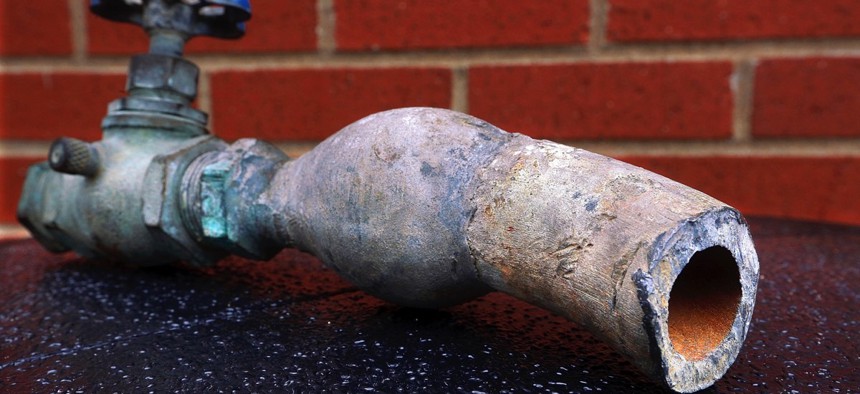Flint-Inspired Senate Bill Provisions Would Finance State Water Infrastructure

Lead pipes aren't limited to Flint, Michigan. Galesburg, Illinois officials displayed their own aging water infrastructure. Seth Perlman / AP Photo

Connecting state and local government leaders
The bipartisan legislation aims to help states with localities struggling to deal with contaminated drinking water.
Two U.S. senators introduced a bipartisan bill Tuesday that would authorize $9.3 billion in investment across 25 U.S. Army Corps of Engineers projects in 17 states to strengthen their failing water infrastructure.
Co-authored by Oklahoma Republican Jim Inhofe and California Democrat Barbara Boxer, the Water Resources Development Act of 2016 also includes a previously floated emergency drinking water aid provision for cities like Flint, Michigan.
The legislation promotes innovative technologies, some geared toward water conservation, and $170 million in loans, dropped from the Senate’s energy bill, for states facing contamination crises.
U.S. Conference of Mayors CEO and Executive Director Tom Cochran applauded the measure for assisting cash-strapped cities with improvements:
This bill will provide, among other things, the necessary tools of Integrated Planning, Green Infrastructure, Affordability, as well as new financing tools and funding that will be instrumental as we move forward in helping sustain our infrastructure and provide critical services. The measure also authorizes much needed resources to the City of Flint and other cities, which find themselves with a crisis of lead exposure due to their drinking water systems. S. 2848 provides resources to both the public sector and private citizens for lead pipe replacement, loan forgiveness, as well as lead testing in schools and child-care facilities.
If passed, the legislation would steer $230 million to a grant program helping poor, disadvantaged communities meet public health standards outlined in the Clean Water and Safe Drinking Water acts.
“What happened in Flint has shown us how vulnerable some our water systems are, and this bill is a perfect vehicle to upgrade our water infrastructure,” Boxer, who sits on the Senate Environment and Public Works Committee, said in the announcement. “In addition, many projects have been approved by the Corps of Engineers, and we need to authorize those.”
In Boxer’s home state of California, the legislation would fund projects revitalizing the Los Angeles River and restoring wetlands in the San Francisco Bay to improve communities’ flood resilience.
Desalination and water recycling technologies are also proposed in dealing with drought and flooding.
“This year, our bill prioritizes projects that will deepen ports to increase our global competitive advantage, will provide protection from disastrous flood waters, and will help to restore our nation’s critical ecosystems,” Inhofe, who chairs the Environment and Public Works Committee, said in a statement. “WRDA will also address our nation’s aging drinking water and wastewater infrastructure by supporting federal programs that encourage local and private investment, and reform existing authorities to allow states to partner with the federal government when necessary to help disadvantaged or high-risk communities address their water resource needs.”
Dave Nyczepir is a News Editor at Government Executive’s Route Fifty.

NEXT STORY: Okla. Lawmakers Want Federal Balanced Budget Amendment; Assessing Ohio’s Prison Food Contract





